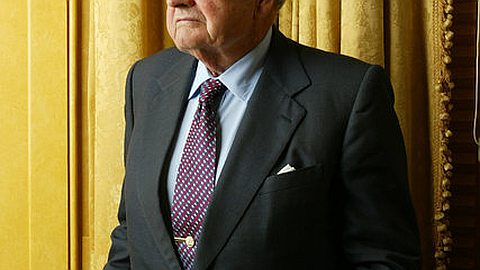What You Should Know About Going Into Business With Friends

Yet commerce has no shortage of business buddies—from Ben and Jerry (grade-school friends) to Hewlett and Packard (college pals). Heck, even Starbucks was created by a group of college chums.
The impulse to start a business with a friend likely strikes everyone at some point in time. But why do some buddy-built ventures thrive—while others end in flattened egos, blistering resentments, and silent treatments?
We tracked down four sets of pals who are in business together to find out the secret to their friendly success.
The Oil-and-Vinegar Business Model
Sharing a love for avant-garde jazz and long-distance running (or the same disdain for them) isn’t necessarily an indicator that the two of you will click when it comes down to a business’ bottom line.
In fact, research from Harvard University suggests that sharing a lot of personal characteristics with a business partner might actually make you less successful. The take-away here: Apply the “opposites attract” rule, and look for someone with complementary skills and talents.
“You want to find someone who fills in your gaps and weak points—and vice versa,” says David Ballard, PsyD, head of the American Psychological Association’s health-workplace initiative. “This way, when you come together as a whole, it works better than what either of you could do individually.”
Take Ken Cornick and Caryn Seidman-Becker, who’ve been friends for more than 17 years (or, to be precise, Cornick was Seidman-Becker’s husband’s friend and a groomsman at their wedding). At one point, Cornick and Seidman-Becker ended up working at the same investment firm, where they shared an office and a client.
“We saw how complementary our skill sets were and how successful we could be professionally as a team—and a lightbulb went off,” says Cornick. A few years later they took over CLEAR, a biometrics company based in New York that speeds up wait times at airport security checkpoints. Since relaunching CLEAR in 2010, the duo have grown the company to more than 130 employees in seven cities, with plans to open another branch in San Antonio this year.
“Caryn would probably describe us as oil and vinegar,” says Cornick. “She’s passionate, and I’m more Zen. She gets inspired by vision, while I like to see the proof in the numbers.”
The Shared Passions Factor
Of course, it’s not a given that, in order to do gangbusters in business, you have to follow the “opposites attract” rule when partnering up with a pal. Some people get lucky and find both B’s—a best friend and a business partner.
That was the case with Stacy Struminger, 44, and Rachel Teyssier, 45, who became fast friends after meeting at a moms play group 12 years ago. After a particularly rainy week in 2011, Struminger (who hates umbrellas) wondered, “Wouldn’t it be great to have a fashionable alternative to a heavy raincoat?” She immediately called to pose the same question to Teyssier, who fell in love with the idea.
The fact that Teyssier was the first person she told was a no-brainer to Struminger: “She’s my best friend, and we talk 20 times a day! With her motivation, we started moving on it the next day.” A year later they launched Rainraps, a line of what they call “waterproof pashminas.”
In their first year, they sold 10,000 of their chic rain covers. And this past May, the duo was chosen by Sara Blakely, the founder of Spanx, for her Leg Up promotion, which spotlights female entrepreneurs in the Spanx catalog and other media. Sales have quadrupled since the announcement.
Nowadays, the womens’ kids tease them about how “wrapped up” they are in their company, which is located in Richmond, Va. “They say, ‘You guys don’t talk about anything else,’” says Struminger. “I try to explain to them that work doesn’t have to be such a negative thing. We have fun talking about every aspect of the business. It’s never, ‘Ugh. We have to go through our P&Ls.’”
Struminger and Teyssier boostrapped Rainraps together from the get-go, but sometimes business ventures with friends evolve over time.
In 2007, Dustin Malstrom, 36, founded reMade as an architecture design firm. While working on one of his first assignments—restoring a historic New York City townhouse for the artist and filmmaker Julian Schnabel—he met Jon (pronounced “yoon”) Osis, 37, an independent technology consultant who’d been hired to install innovative features throughout the building, such as adapting a rotary phone handset to be used with an iPhone.
Malstrom and Osis hit it off from the start. For several years, they continued working together independently, bringing each other in on separate projects while building a close friendship that even included a guys camping trip in an Arizona desert. One day, Malstrom suggested that they partner up officially. In the summer of 2012, Osis joined the company—and reMade became a technology and design firm, with offices in New York and California. Since joining forces, they’ve doubled their clientele.
Now the duo are constantly passing Google documents back and forth, with their visions for the company and their plans for how they want to see it grow. “We’re both so passionate about what we do, and we get to share that experience together,” says Malstrom. “We feed off each other and inspire one another.”
Malstrom may be onto something, says Ballard, noting that such a passion-inspiration combination can contribute to engagement. Plus, research suggests that it’s a must-have for a positive and productive work experience—whether you’re running the company or not.
But Be Sure to Keep That Passion in Check
Saptosa Foster, 37, and Shante Bacon, 36, say that the key to the success of their New York-based entertainment PR outfit, 135th Street Agency, comes down to the fact that they always put one important thing first: their friendship.
The duo met while working as summer interns at a record label. They kept in touch over the years as Foster pursued a career as an entertainment journalist and Bacon became a music executive. Along the way, Bacon started 135th Street Agency as a side project in 2001, before ultimately leaving her high-profile marketing gig at Def Jam Records to grow her company full-time. She reached out to Foster to help write press materials, and as the two collaborated, they realized that they made a good team. In 2005, Bacon asked Foster to colead the company, which stages social media campaigns and high-profile screenings for television networks and movie studios.
But it hasn’t always been easy—during those first few years, they ended up liquidating their savings (about $20,000 each). There was one particularly lean Christmas when neither could afford to buy Christmas gifts. “We were trapped in a cycle of pitching, pitching, pitching—with no success,” says Bacon.
Foster was feeling most disheartened, and was considering calling it quits, but she was worried that it would damage their friendship. “I told her, ‘This is not prison,’” recalls Bacon, who then assured Foster that she could leave at any time and know that the friendship would survive.
Ultimately, they both stuck it out—and things turned around for the company shortly thereafter. They’ve since become the go-to agency for clients like Disney and OWN: The Oprah Winfrey Network. But the tough times provided a big business lesson: Don’t let a passion for seeing your company succeed supplant your commitment to the friendship itself.
A Vow to Their Businesses
“I tell every guy who I date that this professional relationship has prepared me to be the best wife ever,” says Bacon.
Cornick of CLEAR echos the sentiment that a business partnership is a lot like a marriage. “Initially, it’s like, ‘This is the way I see it,’” he says. “But you also have to see it from the other person’s perspective. You can’t have an ego.”
Checking that ego is especially important when business partners don’t see eye to eye on something. While Cornick and Seidman-Becker don’t disagree often, sometimes Seidman-Becker, the visionary, will have a big idea for the company that numbers guy Cornick will deem too pricey. Occasionally, a compromise isn’t evident—despite numerous attempts to sway the other person’s opinion.
“We’ve found that if you can’t convince the other person, and you’re in a complete deadlock, then it’s best to just do nothing,” says Becker. “You can’t be like a dog with a bone.”
In other words, err on the side of “let it go.” That’s good advice for any relationship that is built to last.





